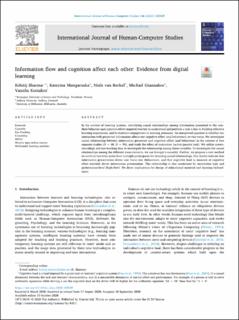| dc.contributor.author | Sharma, Kshitij | |
| dc.contributor.author | Mangaroska, Katerina | |
| dc.contributor.author | Berkel, Niels van | |
| dc.contributor.author | Giannakos, Michail | |
| dc.contributor.author | Kostakos, Vassilis | |
| dc.date.accessioned | 2022-03-16T09:50:15Z | |
| dc.date.available | 2022-03-16T09:50:15Z | |
| dc.date.created | 2021-05-13T13:58:02Z | |
| dc.date.issued | 2021 | |
| dc.identifier.citation | International Journal of Human-Computer Studies. 2021, 146 1-20. | en_US |
| dc.identifier.issn | 1071-5819 | |
| dc.identifier.uri | https://hdl.handle.net/11250/2985430 | |
| dc.description.abstract | In the context of learning systems, identifying causal relationships among information presented to the user, their behavior and cognitive effort required/exerted to understand and perform a task is key to building effective learning experiences, and to maintain engagement in learning processes. An unexplored question is whether our interaction with presented information affects our cognitive effort (and behaviour), or vice-versa. We investigate causal relationship between information presented and cognitive effort (and behaviour) in the context of two separate studies (N = 40, N = 98), and study the effect of instruction (active/passive task). We utilize screen-recordings and eye-tracking data to investigate the relationship among these variables. To investigate the causal relationships among the different measurements, we use Granger’s causality. Further, we propose a new method to combine two time-series from multiple participants for detecting causal relationships. Our results indicate that information presentation drives user focus size (behaviour), and that cognitive load (a measure of cognitive effort exerted) drives information presentation. This relationship is also moderated by instruction type and performance-level (high/low). We draw implications for design of educational material and learning technologies. | en_US |
| dc.language.iso | eng | en_US |
| dc.publisher | Elsevier | en_US |
| dc.relation.uri | https://www.sciencedirect.com/science/article/pii/S1071581920301518 | |
| dc.rights | Navngivelse 4.0 Internasjonal | * |
| dc.rights.uri | http://creativecommons.org/licenses/by/4.0/deed.no | * |
| dc.title | Information flow and cognition affect each other: Evidence from digital learning | en_US |
| dc.type | Journal article | en_US |
| dc.type | Peer reviewed | en_US |
| dc.description.version | publishedVersion | en_US |
| dc.source.pagenumber | 1-20 | en_US |
| dc.source.volume | 146 | en_US |
| dc.source.journal | International Journal of Human-Computer Studies | en_US |
| dc.identifier.doi | 10.1016/j.ijhcs.2020.102549 | |
| dc.identifier.cristin | 1909889 | |
| cristin.ispublished | true | |
| cristin.fulltext | original | |
| cristin.qualitycode | 1 | |

